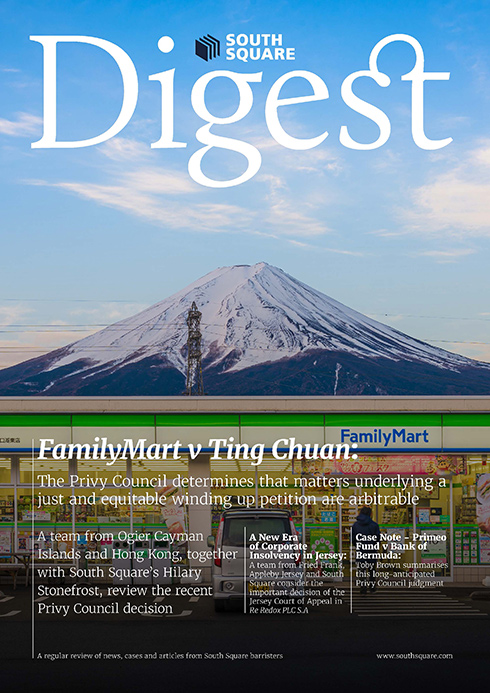

On 17 July 2017, His Honour Judge Hodge QC (sitting as a Judge of the High Court) handed down his extempore judgment in the case of Leeds and another v Lemos and others [2017] EWHC 1825 (Ch), in which Felicity Toube QC appeared for the Applicants. Rose Lagram-Taylor provides a review.
The case revisited the question of whether a trustee in bankruptcy can use documents subject to legal professional privilege belonging to the bankrupt. The Applicants, in their capacity as trustees in bankruptcy (the “TIBs”), had applied for directions in relation to the use of such privileged documents which they had obtained from the former solicitors of the bankrupt, as evidence to support a claim brought under section 423 of the Insolvency Act 1986 (the “IA 1986”) concerning the bankrupt’s alleged transactions to defraud creditors. The TIBs also sought an order in the alternative to compel the bankrupt to waive his privilege in the documents, pursuant to sections 333 and 336 of the IA 1986, to enable them to rely on the documents which in turn would allow them to discharge their duties as trustees in bankruptcy effectively.
However, in confirming what the Judge viewed as the effect of the Court of Appeal’s decision in Shlosberg v Avonwick Holdings Limited [2016] EWCA Civ 1138, HHJ Hodge QC concluded that the right to waive privilege in documents relating to the assets of a bankrupt as well as his liabilities is not property of a bankrupt which is capable of being vested in a trustee in bankruptcy. As a result, the Judge prevented the TIBs from using the privileged documents as evidence in support of the section 423 IA 1986 claim.
In so doing, HHJ Hodge QC also concluded that the principle expounded in Crescent Farm (Sidcup) Sports v Sterling Offices [1972] Ch 553, namely that legal professional privilege enured for the benefit of a successor in title, had no continuing application in bankruptcy cases, which in turn cast doubt on the High Court’s previous decision in Re Konigsberg [1989] 1 WLR 1257, in which the Crescent Farm principle had been applied in the passing of property to a trustee in bankruptcy.
Further, HHJ Hodge QC held that a bankrupt could not be compelled to waive privilege. The Judge reached this conclusion on the basis that the IA 1986 did not expressly provide that a bankrupt must waive privilege if requested to do so, and that there were no exceptional circumstances in which the duties imposed by sections 333 and 363 of the IA 1986 could be relied on to override the bankrupt’s fundamental human right to assert privilege.
As explained at the end of this article, this decision has narrowed still further the ability of the trustee in bankruptcy to use documents free from privilege, leaving trustees in a considerably worse position than their corporate counterparts. Unless the courts can be persuaded to depart from this decision, the legislature may need to step in.
Background
Mr Lemos, the First Respondent, was adjudicated bankrupt on 11 March 2015. He secured his discharge from bankruptcy on 12 March 2017.
Prior to his bankruptcy, Mr Lemos’s sister had issued proceedings against him in the Royal Court in Jersey, alleging that she was entitled to recover sums totalling USD18 million that she had entrusted to Mr Lemos to invest on her behalf, but which she said had been misapplied by him in a failed shipping business. A without-notice freezing injunction was also obtained from the English High Court by Mr Lemos’s sister restraining dealings by Mr Lemos with his assets and any dealings by offshore trustees in relation to the London property in which Mr Lemos and his wife continue to reside (the “Property”). The Property is registered in the joint names of a Bermudian trustee company and one of its directors. However, the offshore trustees, as well as Mr and Mrs Lemos, contended that the Property was held on trust for Mrs Lemos alone.
After Mr Lemos’s failure to defend the proceedings brought against him, his sister obtained judgment in default for USD17.9 million. It was on this basis that Mr Lemos successfully petitioned for his own bankruptcy. The TIBs were accordingly appointed on 1 April 2015.
The freezing injunction was successfully lifted at first instance by an application made by the offshore trustees in May 2015. However, Mr Lemos’s sister obtained permission to appeal, with the injunction being reinstated pending the hearing of the appeal. During this time, Mr Lemos’s automatic discharge from bankruptcy was also suspended for one year as a consequence of his refusal to cooperate with the TIBs.
With the appeal hearing pending, the TIBs became aware that the law firm Withers had previously acted for Mr Lemos, and obtained their files. Certain of the documents were provided to Mr Lemos’s sister to use in the appeal. In applying for permission to rely on those documents, the Court of Appeal admitted the evidence, and held that there was a good arguable case that the transaction resulting in the Property becoming held by offshore trustees constituted a transaction defrauding creditors as per section 423 of the IA 1986. It was subsequently held by the Court of Appeal that the injunction should remain in place pending the outcome of the proceedings under section 423 of the IA 1986 (the “section 423 Proceedings”).
The section 423 Proceedings are accordingly being pursued for the benefit of the bankruptcy estate, with any recoveries being payable to the TIBs. Although Mr Lemos is now a discharged bankrupt, there remain significant debts in the bankruptcy estate together with limited recoveries. The TIBs had therefore made an agreement with Mr Lemos’s sister requiring her to consent to their substitution as claimants in the section 423 Proceedings, or else to their joinder as co-claimants with her. The ability to use the documents obtained from Withers was viewed as significant for the benefit of the section 423 Proceedings.
Nevertheless, a dispute arose between the TIBs on the one hand and Mr and Mrs Lemos on the other, with regards to the former’s ability to rely and make use of the Withers documents in the section 423 Proceedings. In particular, both Mr and Mrs Lemos objected to the use of the documents on the basis that they claimed they were privileged.
Legal Issues
The Court had to consider the extent to which legal professional privilege enjoyed by a bankrupt passed to his or her trustee, and the extent to which the trustee could waive that privilege without the consent of the bankrupt, or third parties, who shared the benefit of the privilege. As categorised by the TIBs, there were essentially two questions which the Court had to ask itself:
(1) The Avonwick initial question: Assuming for the purposes of the application that some or all of the Withers documents were privileged, and that privilege belonged to Mr (and/or Mrs) Lemos, were the TIBs entitled to deploy those documents without the consent of Mr (and/or Mrs) Lemos?
(2) The section 363 IA 1986 initial question: Assuming that some or all of the Withers documents were subject to privilege belonging to Mr Lemos, and assuming that the TIBs were not automatically entitled to use those documents, could Mr Lemos be ordered to waive his privilege, such that the documents could be used by the TIBs in the section 423 Proceedings?
Accordingly, the application required close consideration of the true meaning and effect of the decisions of Mr Justice Arnold at first instance in Shlosberg v Avonwick Holdings Limited [2016] EWHC 1001 (Ch), and of the Court of Appeal affirming Mr Justice Arnold’s decision in the same case, [2016] EWCA Civ 1138.
This in turn required the Court to determine (i) whether the principles formulated in Crescent Farm continued to apply to bankruptcy, and (ii) whether the decision in Re Konigsberg remained good law.
Avonwick
Given the centrality of the Avonwick decisions, it is important to note the facts of both the first instance and Court of Appeal cases.
The bankrupt, Mr Shlosberg had applied for an injunction to restrain a firm of solicitors from continuing to act both for the major creditor in his bankruptcy, Avonwick, and his trustees in bankruptcy. Despite the bankruptcy, Avonwick were continuing to bring proceedings against Mr Shlosberg alleging conspiracy. It was Mr Shlosberg’s case that because the solicitors had been acting for both parties, those that were representing Avonwick had seen a large number of documents which were subject to privilege belonging to him. Therefore, as solicitors acting for an adverse party had seen privileged documents to which they were not entitled, the firm should cease to act for that party.
There were three categories of documents at issue. Category A documents related to an asset of the bankruptcy, being a County Court award to Mr Shlosberg due to an attack on his cat. Category B documents related to liabilities of the bankrupt, namely certain statutory demands. Category C documents also related to liabilities arising from a claim brought by Avonwick.
At first instance, Mr Justice Arnold held that the trustees in bankruptcy acquired the benefit of Mr Shlosberg’s privilege in the Category A documents because those related to an asset of the bankrupt. This was on the basis of the previous decisions in Crescent Farm and Re Konigsberg, it being common ground that Re Konigsberg was based upon Crescent Farm because the privilege related to an asset which had vested in the trustee in bankrupt. However, this was not the case with the Category B and C documents, where the trustees in bankruptcy did not acquire the benefit of the privilege over those documents because those related to liabilities rather than assets of the bankrupt.
The Court of Appeal did not deal with the Category A documents (no appeal being issued in relation to those documents by Mr Shlosberg). However, in relation to the Category B and C documents, the Court of Appeal largely upheld Mr Justice Arnold’s decision in relation to documents regarding liabilities. The main argument advanced by Avonwick was that the Category B and C documents, and the privilege attaching to them, were property which formed part of the bankrupt’s estate which vested in the trustees in bankruptcy on their appointment. Nevertheless, whilst the Court of Appeal noted the importance of the policy that trustees in bankruptcy should be able to realise and distribute the bankrupt’s estate, this was trumped by the policy that a litigant should also be able to consult a lawyer in privacy and therefore be able to exert and retain his privilege.
Thus, the Court of Appeal decision suggested that the Crescent Farm principle did not assist in relation to documents relating to the liabilities of the bankrupt, holding that where such documents are concerned, although the privileged documents do pass to a trustee on bankruptcy (who could therefore see them), the trustee must protect the privilege, the right to waive it remaining with the bankrupt (and therefore the trustee could not use them against third parties). This conclusion was founded on the belief that an individual’s right to privilege is a fundamental human right, entrenched in common law. It was held that the only circumstance in which privilege could be waived by the court was where there was an express statutory power to waive it. There was no such power contained in the IA 1986.
The Parties' Submissions in the Lemos case
Submissions for the TIBs focused on the distinction created in the first instance judgment of Avonwick between assets and liabilities. It was contended that Mr Justice Arnold’s decision in relation to the Category A documents was an orthodox statement of the law and a familiar application of the Crescent Farm principle. It was also emphasised that whilst the Avonwick decision was problematic for documents relating to the liabilities, the documents which the current TIBs sought to rely on related to an asset (i.e. the Property and the section 423 Proceedings), and so they should be entitled to use them in accordance with the Avonwick decision on the Category A documents.
It was also submitted that the Court of Appeal decision did not in any event alter the conclusions reached in the first instance judgment on privilege attaching to documents relating to the assets of the bankrupt, the appeal only being concerned with the Category B and C documents. It was said that this meant that the Court of Appeal decision should not be taken as reaching a different view to Mr Justice Arnold, and should not be taken as disapproving of the Crescent Farm principle and Re Kongsberg’s application of it.
However, the submissions for the First Respondent emphasised the propositions that (i) privilege is a right to resist the compulsory disclosure of information, (ii) privilege is a fundamental human right, (iii) although privilege can be abrogated by statute, this requires express words or necessary implication, and (iv) the courts presume that even the most general words were intended to be subject to the basic rights of the individual.
Further, it was contended that the decision of the Court of Appeal was binding authority that (i) privilege is not property of the bankrupt which automatically vests in a trustee in bankrupt such that Re Konigsberg was no longer good law, and (ii) although a trustee in bankruptcy is entitled to take possession of documents for the statutory purpose of realising a bankrupt’s estate, he is not entitled to do so in a way that would amount to a waiver of privilege without a bankrupt’s consent.
As to the distinction between documents relating to assets and liabilities it was submitted that the Applicant’s argument was misconceived, with the main purpose of the Court of Appeal judgment being to decide whether privilege attaching to information and documents of a bankrupt were property which vested in a trustee in bankruptcy, and what use might be made of such information and documents by the trustee in bankruptcy, so as to mean there is no clear distinction between documents relating to assets and documents relating to liabilities. Further, it was said that no significance could be attached to the fact that the Avonwick appeal was not concerned with the Category A documents because given the content to which the documents related, they were not viewed as important. In any event, it was submitted that Mr Justice Arnold’s decision on the Category A documents was only reached due to a concession by counsel, which in light of the Court of Appeal judgment, could now be viewed as wrong.
Decision
In giving judgment, HHJ Hodge gave consideration to the five questions raised by the TIBs in their reply submissions:
- What did Avonwick decide at first instance about documents relating to assets?
- Was its decision in that regard overruled by the Court of Appeal?
- As a result of Avonwick, does the Crescent Farm principle still apply in bankruptcy?
- If there are documents about assets that have passed to the trustees, can the trustees waive privilege in those documents?
- Are documents relating to the Property covered by the Crescent Farm principle? In answering these questions, HHJ Hodge held that it had been made clear in the first instance decision of Avonwick that it was not relevant to consider whether privilege had been abrogated, it only being argued that privilege had been transferred to the trustee in bankruptcy.
HHJ Hodge rejected this approach, asserting that the Court of Appeal emphasised that from a bankrupt’s perspective, the key question was whether the statutory bankruptcy code had involuntarily deprived the bankrupt of his fundamental right to assert privilege. Even where privilege is only transferred, this would still amount to abrogation from the bankrupt’s perspective.
Further, although HHJ Hodge acknowledged that the documents referred to in the Court of Appeal judgment related only to the Category B and C documents, he took the view that the Court of Appeal nevertheless concluded that from the point of view of the bankrupt, he was being involuntarily deprived of his fundamental right to assert privilege over documents. There was therefore no distinction between assets and liabilities.
This meant, according to the Judge, that the Crescent Farm principle did not apply in bankruptcy. Moreover, it was held that the principle had only been accepted with reservations by Mr Justice Arnold because the contrary had not been argued. HHJ Hodge further held that, on the basis that the Court of Appeal did not endorse the view of Mr Justice Arnold that the involuntary transfer of privilege did not involve an abrogation of privilege, this meant that the first instance judgment in Avonwick could not be taken as authority for the Crescent Farm principle.
In any event, HHJ Hodge held that all that had been decided in Crescent Farm was that the right to assert privilege could voluntarily pass to a successor in title. It did not decide that a successor in title could waive the privilege. Therefore, it was confirmed that the principle could have no application in bankruptcy, even in relation to assets. This in turn meant Re Konigsberg was wrong in law.
Overall, this led to HHJ Hodge to reach the conclusion that as privilege was a fundamental right, it could only be overridden by statute if the applicable legislation did so expressly. Here, the IA 1986 gave no such authorisation. Therefore, whilst it was accepted that the TIBs should have access to documents in which the bankrupt enjoyed privilege under section 311 of the IA 1986, this did not extend to the ability to waive that privilege, the privilege remaining with the bankrupt.
As to whether the bankrupt could nevertheless be ordered to waive his privilege in applying sections 333 and 363 of the IA 1986, HHJ Hodge held that he could not, preferring the First Respondents’ submissions which again focused on privilege being a fundamental right, which in line with the jurisprudence of the European Court of Human Rights, could only be overridden in exceptional circumstances. As per HHJ Hodge, there were no such exceptional circumstances here.
Comment
The practical effect of this judgment is that trustees in bankruptcy cannot use privileged documents where the privilege belongs to the bankrupt, regardless of whether those documents relate to an asset or a liability. A trustee in bankruptcy retains the right to see the privileged information where necessary to enable his duties to be carried out with regards to the bankrupt’s estate. However, that privilege can no longer be waived without the bankrupt’s consent. Further, the court has made it clear that there is no express authority in the IA 1986 to compel a bankrupt to waive his privilege.
The problem for the TIBs in this case lay in the Avonwick decision in the Court of Appeal. In the light of that precedent, they were driven to maintain that in the context of bankruptcy and privilege documents relating to assets were different from those relating to liabilities. The Court of Appeal had not been persuaded that trustees in bankruptcy were in the same position as their corporate analogues (where privilege undoubtedly does pass).
Avonwick was a difficult case, relating to conflicts of legal advisers. It is possible to see how the Court of Appeal reached its conclusion on the facts of that case, and moreover there is much to be said for the fundamental human right of a person in being able to consult his lawyer. Nevertheless, insolvency lawyers might be surprised to see that in personal insolvency that fundamental right trumps the rights of creditors. There is some basis for that conclusion. However, Avonwick only related to the use of a bankrupt’s privileged documents against third parties; Lemos goes further, denying a trustee the ability to use such documents even against the bankrupt.
The judgment in Lemos is therefore another nail in the coffin of the ability of trustees in bankruptcy to bring proceedings relying upon privileged documents. There is a distinct oddity in the fact that a trustee is expressly empowered by the Insolvency Act to look at a document that shows a claim (or for that matter makes it clear beyond doubt that a bankrupt is not subject to an asserted liability) but that he cannot rely upon it.
There is therefore much to surprise and concern an insolvency lawyer in this case:
- The Judge did not maintain the distinction between assets and liabilities, even though the Court of Appeal did not consider the Category A (“asset” documents) in Avonwick.
- The Judge held that Crescent Farm did not apply in insolvency, even though the Court of Appeal had not said so, nor did the Court of Appeal expressly overrule Re Konigsberg.
- The Judge reached the conclusion that Crescent Farm is authority only for privilege passing to a successor in title, rather than also allowing the successor to waive it. There is an oddity in suggesting that privilege passes for only one purpose but not for any other.
- The Judge took the view that neither section 423 of the IA 1986 (nor, it appears, transactions at an undervalue or preference claims) are property of the bankrupt’s estate.
An appeal is not to be pursued in the Lemos case. It remains to be seen whether the Court of Appeal (or, in due course, the Supreme Court) will revisit this issue of the conflict between the fundamental right to consult a lawyer and the powers of trustees in bankruptcy to gather in the assets of a bankrupt. Ultimately this may be a decision for the legislature.






![Brake & Anor v The Chedington Court Estate Ltd [2023] UKSC 29](https://southsquare.com/wp-content/uploads/2024/02/Brake-Anor-scaled-e1728649908896.jpeg)






![New Judgment: CM Telecom (UK) Ltd v Buck [2026] EWHC 161 (Comm)](https://southsquare.com/wp-content/uploads/2025/06/tingey-injury-law-firm-DZpc4UY8ZtY-unsplash-scaled-e1750759105761.jpg)
